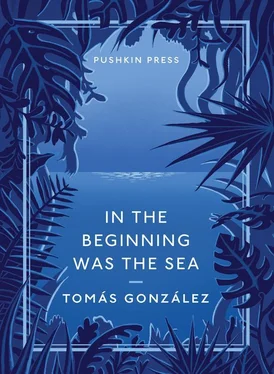“Is the hunting good around here, Don Carlos?”
“Agoutis, armadillos, a few wild turkeys,” said the old man, “though they’re all dying out… or rather we’re killing them off.”
Suddenly they came to a clearing in the woods and saw about a dozen shacks with cob walls and palm-thatched roofs. The dirt track that also served as the village square was impeccably swept. At the end of the path was an orange grove which looked extraordinarily verdant and cool.
As they strolled through the village, faces appeared from windows. People sitting on their porches called, “ Salud , Don Carlos!” and he greeted each of them by name. The old man had already mentioned the village: it was inhabited by a single family and every time a couple married they were apportioned a plot of land and the villagers helped build a new house; everyone was ruled by the moral authority of the grandmother.
Her house was located at the centre of the village.
“ Salud , Doña Rosa,” said Don Carlos as they came to the house.
“Come in,” called a faint voice from inside.
The house consisted of two rooms and a kitchen; the rooms were at the front while at the rear there was a lean-to kitchen. The first thing J. noticed as they entered was a plaster statue of the Virgin almost three feet tall which had pride of place on a low table and was lit by a votive candle. Next to it was a large, pale-green plastic radio. Doña Rosa sat enthroned in a red wicker chair. In the next room, he could dimly make out a mosquito net. The living room was cool and hazy and smelt of smoke.
The old woman apologized for not getting up to greet them, explaining that her rheumatism always played up in cold weather. She gestured for them to sit in two rough-hewn wooden chairs that tipped backwards alarmingly like some prehistoric imitation of a rocking chair. Sitting in his anti-rocking chair, J. found himself facing a back door which led out into a yard where pigs and chickens scrabbled about under a grove of mango trees. On the ground were several windfalls already gnawed by the pigs.
Doña Rosa and J. took to each other immediately. When Don Carlos explained who J. was and why he had come, the old woman stared at him with eyes that saw much more than she pretended and solemnly told him that the villagers would be at his service. Then she asked Don Carlos whether he was thinking of leaving the area.
“J. has bought one of my fincas , but I’m keeping the other,” said Don Carlos. “You know I could never leave this place, Rosita.”
The old woman looked pleased. She also looked happy when J. mentioned that he and his wife were planning to live on the finca .
“When you come, call by and visit this old woman,” she said.
Some days after they arrived, J. suggested to Elena that they visit Doña Rosa. The narrow path leading to the village seemed much less wild and overgrown. “I won’t let anyone cut down another kapok tree on this farm,” he said as they passed several large fresh stumps. In the village, they were greeted as before. Elena watched black faces appear at the windows and could feel the eyes of children staring at her through chinks in the walls. Outside Doña Rosita’s house, three naked youngsters were dragging along matchboxes tied together with thread. “Holaaaa!” people called when J. greeted them.
This time, the old woman did not seem ill or infirm. She served them black coffee in floral cups of delicate bone china that starkly contrasted with the ceiling of palm fronds, the smoke belching from the kitchen and the beaten earth floor.
Doña Rosita was not particularly gracious towards Elena — she served the first cup of coffee to J. — although she was friendly and talkative. She had twelve children, she told them, sixty grandchildren and three great-grandchildren. Eight of her children were still living in the village — four girls and four boys, all but one of them married — while her four other daughters had been taken by their husbands to live elsewhere. She told them that she had been married four times and had buried four husbands. His previous visit had left J. with the impression of a weak, crippled woman; now he saw her as she truly was: a forceful woman trapped in a tiny body, wizened by the years.
When they took their leave, the old woman addressed Elena as “ seño ” rather than Doña Elena though she had pointedly referred to Don Carlos’s wife as “Doña” during their visit. Elena was quick to notice the difference in address and only with some effort did she manage not to take it as a personal insult.
“What a filthy dump,” was her only comment when they arrived back at the house.
Three days later, at 6 p.m., a little girl appeared carrying a gleaming battered crockpot.
“My grandma sent this for you,” she said.
It was a crab stew. J. took it and poured the contents into a saucepan — the claws tinkling against the tin — and gave the pot back to the girl.
“Here… for you,” he said, holding out a ten-peso note. The child looked at J., her eyes shining, almost coy, and thanked him. Before she left, she said if they had any clothes to give away they could give them to her.
The dining room consisted of a simple rough-hewn table on a side porch that overlooked the yard. J. picked up the pot and a single plate and sat down to eat. He did not bother to call Elena, knowing how much she hated crab.
GILBERTO BEGAN to do the weekly shopping at the market in Severá, usually on Sundays. He would set off early on horseback, with a second horse on a leading rein. Every Saturday night, Elena would give him a list of what he was to bring back and lecture him on brands of soap, the quality of the rice, and so forth. This was the only time when the two had anything that might be called a conversation; for the rest of the week, she simply gave him orders — almost always relating to odd jobs around the house — and occasionally enquired about the weather. Whenever she spoke to Gilberto, her voice became brusque and sharp. If there were any problem with the groceries — impurities in the sugar, weevils in the black beans — she would reprimand him twice: once when he got back from the market and a second time the following week while she was giving him the new shopping list.
“If we’re not careful, that man will be bringing back whatever he feels like,” she explained to J. once, when she saw that he was uncomfortable with her curt manner.
Gilberto would set off at first light and come back at dusk, usually stinking of booze, half a bottle of aguardiente tucked into the back pocket of his trousers and a certain awkwardness to his movements. He was never falling-down drunk. His eyes shining and a little glassy, he would take the groceries from the packhorse and carry them into the kitchen, then unsaddle his own horse and lead both animals to the stable where he had a few quick shots while doling out their feed. Then he would go into the house to listen to any complaints from Elena who, by then, would have unpacked the groceries while lecturing Mercedes on how to judge the quality of the produce, how certain things should be cooked and others preserved…
In the early days, J. got drunk only once a week. Every Sunday, at about three in the afternoon, he would go out to the paddock and pick a few green mangoes from the tree which Mercedes would peel and slice. Then J. would settle himself at the dining table, sometimes with Elena, setting the fruit, a salt cellar and a bottle of aguardiente next to his chair. By the time Gilberto arrived, the bottle would often be half-empty. When Elena was not with him, J. was delighted by Gilberto’s arrival, knowing that as soon as he had carried in the groceries, he would come out and join J. on the veranda, take the bottle from his back pocket and offer him a drink. Between them, they would finish off Gilberto’s flask of aguardiente while discussing any work that needed doing — though more often in silence — then they would drink J.’s bottle.
Читать дальше










